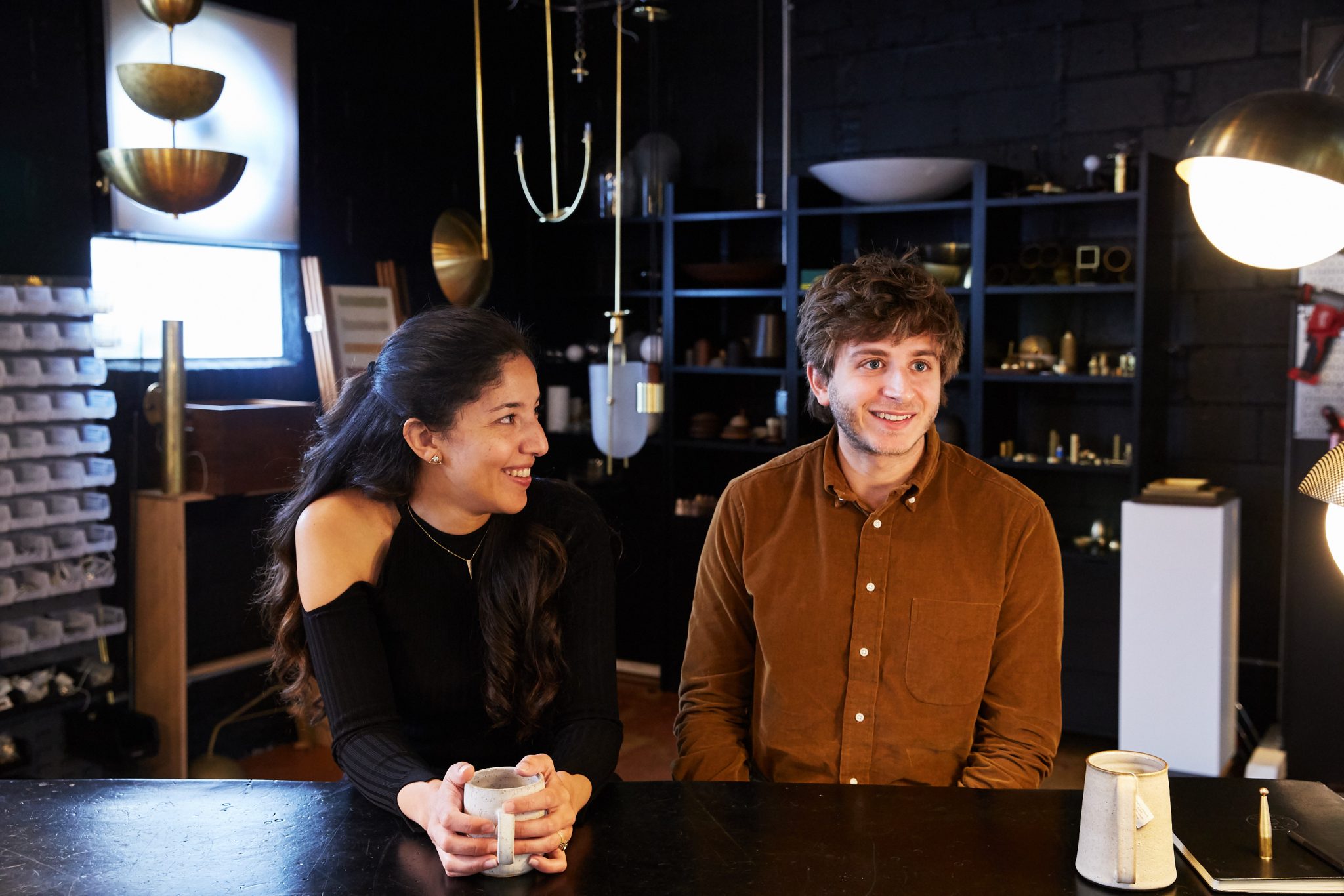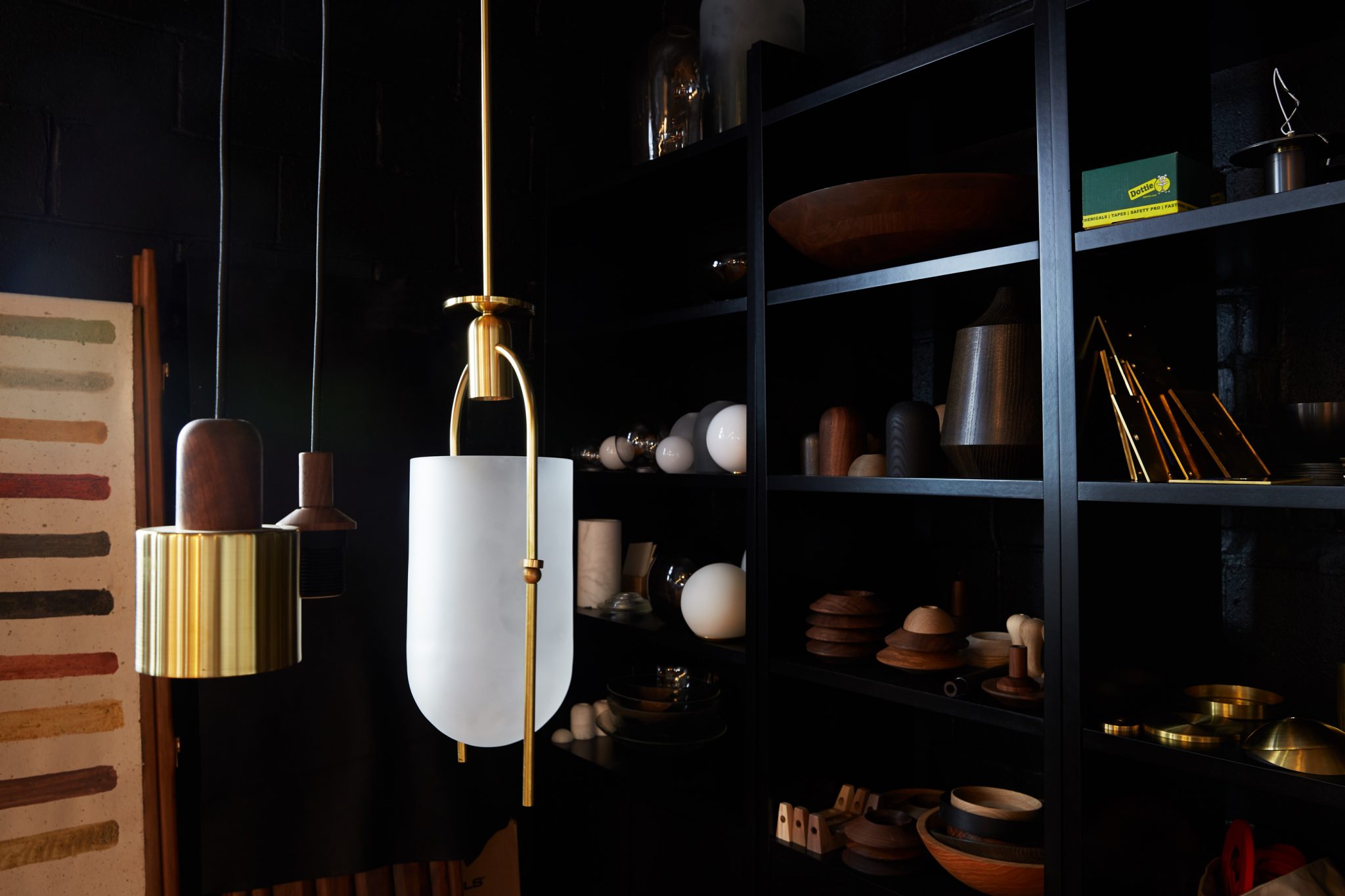We want to support and elevate American manufacturing. Allied Maker is a manufacturer, but we’re not traditional manufacturing. We’re artisan manufacturing, and I think that’s what draws what we’re calling a creative hub.
— Ryden Rizzo
Follow the crowds to Brooklyn or the Hudson Valley and you’ll find yourself neck-deep in New York designers. Hit the Long Island Expressway and head out to the North Shore, however, and you’ll have to try just a little harder to find Allied Maker — an exceptional lighting studio tucked away in the unexpected reaches of Glen Cove, NY. This town, a former gem of the Gold Coast, is still studded with mansions and other early 20th century remnants of the wealth signaled by names like Vanderbilt, Astor, Whitney and Morgan, but had lost some of its gilded sheen over the years. Today, as The New York Times has reported, it’s poised to reclaim its role as an important destination — and with Allied Maker attracting new interest and talent from far and wide, Glen Cove is also on its way to becoming New York State’s next and possibly most surprising creative hub.
The brand is a homegrown labor of love for the couple at its helm, who both have history in the North Shore. Ryden Rizzo founded Allied Maker in his parents’ garage just a few minutes down the road; a mutual friend introduced him to his future wife (and Creative Director) Lanette after she switched coasts. Together, in the span of 5 years, they have grown a fledgling operation into a thriving business that employs dozens of folks from the region as well as New York City and beyond, offering in-demand artisan handcrafted lighting products with an emphasis on understated elegance, raw materials and honest finishes. (All while giving birth to another passion project: son Landen, now a toddler.) What began in the imaginings of a single maker is quickly swelling into a creative community unlike anything the area has seen, and Allied Maker is on a mission to nurture and continue its growth.
We met Ryden, Lanette and pup Ivy for a tour of their busy studio, manufacturing and fulfillment space, and a walk-through of their future home — a nearby 1958 Jasper Ward fixer-upper where the couple’s love of local designers, emerging brands and, of course, great lighting will soon be on display.
RONEN LEV: How did Allied Maker get its start?
RYDEN: The big source of inspiration was the maker community. I was just looking people up online who made anything — leather, wood — and sort of immersing myself in the collective design consciousness. I started making my first light, and also a knife and cutting board and spreaders. Lighting, without me being really aware of it, perfectly lined up with everything in my entire history as a designer. My dad’s a jewelry designer, and lighting is the jewelry for the home. I have a background in woodworking from learning how to make guitars. And my studies at school were based on light and sound. So it was sort of like a bell rang. I made my first light and got 70 orders and that was it.
LANETTE: In the beginning, there was a huge maker community on Instagram that became integral to the early development of Allied Maker. People were sharing their stories on Instagram and sharing their process, and that was really inspiring. The beauty of social media is that people can see what you’re doing as you’re doing it, which continues to influence us and inform our decisions and design process.
RONEN LEV: What was your roadmap for the business in the early days?
RYDEN: It was just figuring it out. Staying up until 3 in the morning, many, many nights. Getting started, I wasn’t anybody in the industry. I didn’t know the industry at all. I remember the first email I got from an interior designer, not even that many years ago, saying, “Do you have a trade discount?” And I had to Google “trade discount” because I had no idea what that was. At the time we were breaking a lot of the industry rules. I just wanted to work. I wanted to make the work, so a lot of the products starting out were underpriced so I could produce it. Now we’ve learned and refined.
RONEN LEV: How did the two of you join forces?
LANETTE: I had decided to change up what I was doing, and someone said, “Oh, you should meet Ryden, you’re going to love him.” And I did and it was so amazing. We totally hit it off and I was very inspired by him. I was drawn in by how passionate he was about the products he was creating, and that really resonated with me. I think that’s what resonates with everyone who sees our products — the excitement that he pours into creating them, it reads. It carries through whether you’re working directly with him or you’re seeing it online.
RONEN LEV: Allied Maker has grown pretty quickly from a one man operation. Can you tell us a little bit about how you’ve built the team?
RYDEN: When we started, everyone who worked here was local. My first employee was a friend of mine who was applying for a job at a restaurant. At the time, all I needed help with was oiling wood, but he’s actually still here. Now, because we’re growing and need to keep hiring, we’ve reached out more. The workforce has gone from all local to include Eastern and Southern Long Island and now it includes Queens, Brooklyn and Manhattan. The commute backwards is not necessarily what people want to do, but because we have a strong brand we are reaching Manhattan. There’s a person who’s going to be part of our engineering team, and he’s going to be coming from the Lower East Side.
In the beginning, there was a huge maker community on Instagram that became integral to the early development of Allied Maker. The beauty of social media is that people can see what you’re doing as you’re doing it, which continues to influence us and inform our decisions and design process.
RONEN LEV: Why do you feel it’s important to bring talent here to the North Shore rather than, say, moving to New York City and setting up shop in Williamsburg or the Navy Yard?
LANETTE: It’s about providing opportunities and elevating this community. Ryden’s vision was really to have a microcosm here, kind of like Industry City, and encourage creativity. We were seeing that out east on Long Island there’s lots of manufacturing, which isn’t as strong any more, but there are lots of people who are really skilled. We want them to have the opportunity to be part of something creative. Our senior assembler now is a guy I knew when he was just in his garage, tinkering. I asked him if he knew Ryden. One day I plucked him out of that garage and now I couldn’t imagine our assembly team without him.
RYDEN: Also, it’s hard for people who are fresh out of school looking to start a career in manufacturing in New York City. Because the union guys are very well established, it’s hard to get in as an apprentice. What we’re offering here is essentially a chance to grow the skill set to become a machinist, a fabricator, a metal finisher.
RYDEN: We want to support and elevate American manufacturing. Allied Maker is a manufacturer, but we’re not traditional manufacturing. We’re artisan manufacturing, and I think that’s what draws what we’re calling a creative hub. When people work here, yes, they’re working in a production manufacturing space, but they’re also getting the satisfaction out of being an artisan and doing something creative. So it’s a really interesting blend that’s been done before, but it’s very few and far between in terms of businesses that still do that.
RONEN LEV: Your designs center on a handful of natural materials — brass, glass, hardwood. Can you tell us why you’re partial to these elements?
LANETTE: [Laughs] We used to joke that the only colors Ryden sees, because he’s color blind, are walnut and brass.
RYDEN: Everything we do comes from a place of love for the material. We use a lot of oxidations, patina finishes. Nothing’s just slopped with gold paint or something to cover up. I think it was inspired by a frustration with interacting with objects that seemed like the finish was fake.
LANETTE: We like to use the term “honest finishes” because we just want to accentuate the material and not make it something it’s not.
RONEN LEV: Is there a material you especially love working with?
RYDEN: Alabaster is a new material I really love right now. It’s perfect material for lighting because it’s translucent stone but it’s workable. It has a soft friendliness to it. You can carve it. It’s not like a hard rock that you have to chisel. It’s considered a semi-precious stone, and it’s just so beautiful when it’s lit up.
RONEN LEV: Do you see yourself ever moving beyond lighting?
LANETTE: We’ve talked about it a lot. We have an idea of where we want to grow in the home goods market but there’s still a lot of lighting to do.
RYDEN: I think we’ll expand more to hardware, kitchen accessories, door pulls and things like that. Custom hardware. Stuff that relates to our obsession with material.
RONEN LEV: A lot of our own design work is with people who are looking for less of a “decorator” and more of a thoughtful approach to how they live. Your products and materials fit so well into that. Are we on to something here—is there a movement away from the traditionally overdecorated American style?
LANETTE: There’s definitely a decluttering and then just picking really quality things. Less stuff and more quality so that everything in a space makes you feel good.
RYDEN: Decluttering so you can appreciate the simplicity of the form and the quality of materials. That’s why our designs have to be made from the best materials, otherwise it loses its interest because it’s an interest in the materials.
LANETTE: It’s not like people are moving away from purchasing art, but I think more people are choosing functional objects for the home that feel like art, so that they can have a good balance with less stuff.
RONEN LEV: You guys are working on renovating the house you’ve just bought, about ten minutes from here. Who do you envision filling your house with, furniture-wise?
RYDEN: We want some BDDW!
LANETTE: Tyler Hays’ story is so interesting. We’re also inspired a lot by the story of when he first opened his showroom in Manhattan. He did all the work himself, tooth and nail, trying to get it done.
RYDEN: We’re thinking a lot about that now as we’re about to open a showroom in TriBeCa. It’s on Franklin Street, within walking distance of Colony, Roll & Hill, BDDW, David Weeks, Gabriel Scott. We’re looking forward to spending more time in the city. You sort of feel isolated in Long Island if you’re always here — we do need that Manhattan presence, too.
Allied Maker works directly with designers to offer competitive trade pricing and site-specific design engineering and fabrication service. Email [email protected]
















































